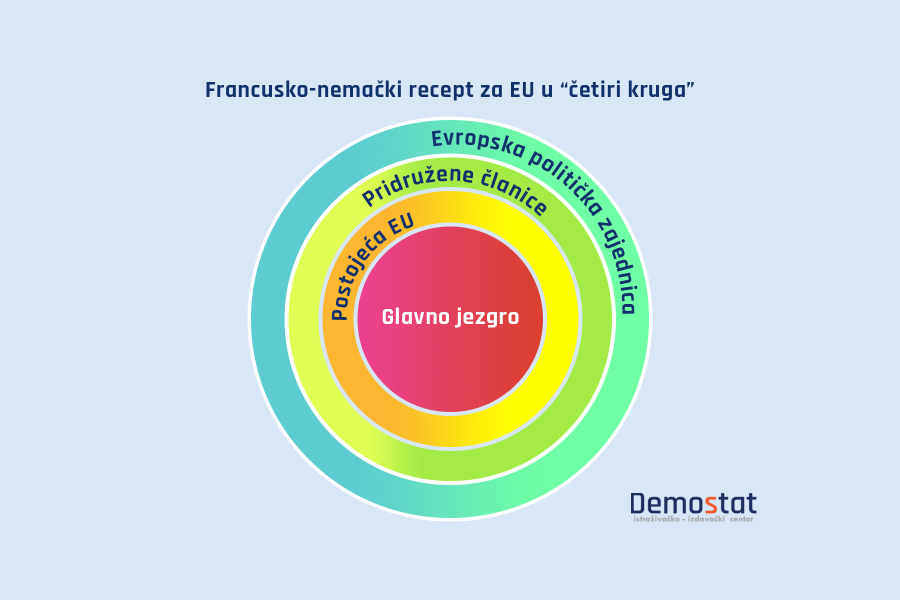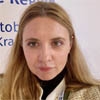One of the authors of the document, Olivier Costa, Director of Research at the College of Europe, stated, "We now have pressure motivated by geostrategic reasons to consider the expansion of the Union, especially towards Ukraine, which will have consequences for the institutions, policies, and budget of Brussels."
The "differentiation" proposal, or division into four circles, implies that "associated members" adhere to Union principles and are part of the single market but do not enjoy all the rights as countries in the first and second circles. Such a concept invokes the "Two- or Multi-speed Europe model," which emerged at the end of the Cold War before adopting the Maastricht Treaty (1993).

One of the authors of the document, Olivier Costa, Director of Research at the College of Europe, stated, "We now have pressure motivated by geostrategic reasons to consider the expansion of the Union, especially towards Ukraine, which will have consequences for the institutions, policies, and budget of Brussels."
The "differentiation" proposal, or division into four circles, implies that "associated members" adhere to Union principles and are part of the single market but do not enjoy all the rights as countries in the first and second circles. Such a concept invokes the "Two- or Multi-speed Europe model," which emerged at the end of the Cold War before adopting the Maastricht Treaty (1993).

French and German experts have unveiled a proposal for comprehensive reforms of the European Union in response to increasing pressure to admit new member states by the end of this decade. The study, titled "Sailing on High Seas – Reforming and Enlarging the EU for the 21stCentury,” was developed by 12 experts from the two largest EU countries with the aim of altering the rules to prepare the EU for the accession of "three or more countries." As a result, the authors propose a model of the Union with four concentric circles: the first, an "inner circle" (countries desiring closer integration in specific areas); the second circle, simply named "EU" (the existing Union); the third circle - "associated members," and the fourth circle - "European political community" (a loose community of European leaders who would meet twice a year to discuss matters).
One of the authors of the document, Olivier Costa, Director of Research at the College of Europe, stated, "We now face pressure motivated by geostrategic reasons to consider the expansion of the Union, especially towards Ukraine, which will have consequences for the institutions, policies, and budget of Brussels." The proposal includes introducing significantly stricter rule-of-law provisions, new voting procedures in the European Council, and the possibility of increasing the Unions budget. The concept of "differentiation," or division into four circles, implies that "associated members" adhere to Union principles and are part of the single market but do not enjoy all the rights as countries in the first and second circles. Such a concept harks back to the "Two- or multi-speed Europe" model, which emerged at the end of the Cold War, before the adoption of the Maastricht Treaty (1993), during debates about expanding into Central and Eastern Europe. It involved the idea that different EU member states could integrate at different levels and paces.
French and German Ministers for Europe, Laurence Boun and Anna Lührmann presented the latest potential "roadmap" to ministers from other member states this week in Brussels. Heads of state from the Union are expected to discuss this proposal at an informal summit scheduled in Granada next month. "Its clear that the expansion of the Union goes hand in hand with EU reforms. We need to start this now," Lührmann told reporters in Brussels.
The timing of the unveiling of this proposal is not surprising, as there has been an intensified debate about EU expansion this summer. As a reminder, European Council President Charles Michel mentioned the year 2030 as a possible deadline for admitting new members, emphasizing that energy, the single market, defense, and security would be among the critical criteria for "progressive" integration into the EU. German and French experts in the document specify that the so-called "European political community" would have 44 member countries. "It is possible that some countries outside the European Union may not want to join as full members or may not be able to but would like to join in some other way," explained Costa, who also noted, "We may also be in a situation where some existing member states are no longer interested in being part of such a European Union or may feel more comfortable in another circle."
The French-German study advocates for changes in the decision-making system across most areas of the EU, proposing a shift from unanimous decision-making to qualified majority voting in almost all domains. If such a scenario were to be realized, individual member states would no longer be able to veto decisions such as imposing economic sanctions, arms supply, or financial assistance to Ukraine, as Hungary has previously done.
The proposal also suggests that the European Parliament should continue to have a maximum of 751 members while reducing the number of EU commissioners. Simultaneously, it calls for the introduction of significantly stricter rules, justified by the need to protect the fundamental values of the Union – democracy and the rule of law. This means that existing candidate countries (including Serbia) must intensify their efforts against corruption, carry out judicial reforms, and "strengthen media freedom" because these values are "seriously endangered." EU member states that violate rule-of-law provisions would face sanctions, including reduced funding from the Unions budget.
"Softening" of the stance of Paris
The latest "roadmap" for EU reform shows that official Paris has significantly shifted its stance on accessing new Union members. Just as a reminder, French President Emmanuel Macron stated in May 2018 at a summit held in Sofia that EU enlargement to the Western Balkans should wait until the Union resolves its internal issues, a viewpoint that differed from official Berlins stance. Macrons rhetoric was echoed by Nathalie Loiseau, who, as the French Minister for Europe in February 2019, prior to her visit to Belgrade, stated that "the current state of the European Union does not allow for new accessions under satisfactory conditions, both for the European Union and for the new states seeking to join. We must reform the European Union and review its functioning." However, the situation has since changed significantly, partly due to the war in Ukraine, and France has now aligned with Germany on the need for EU expansion. This demonstrates the return of the Franco-German axis on the scene. The re-establishment of a political alliance between Paris and Berlin is evident not only in their joint proposal for EU reform but also in their joint proposal for resolving the Kosovo issue, which served as the basis for the so-called "Ohrid Agreement" (Agreement on the path to normalizing relations between Serbia and Kosovo).
Published on September 21st, 2023
In all societies there are issues that are rather being skipped. Certain...
The neoliberal path, started in 2001, has led to especially bad results in Serbi...
For centuries, the region was subsumed within the Ottoman and Hungarian Empires,...
"Serbia has returned to the systemic and anti-systemic position of the political...
In reality, Serbia is closer than ever to NATO. In the course of the last five y...